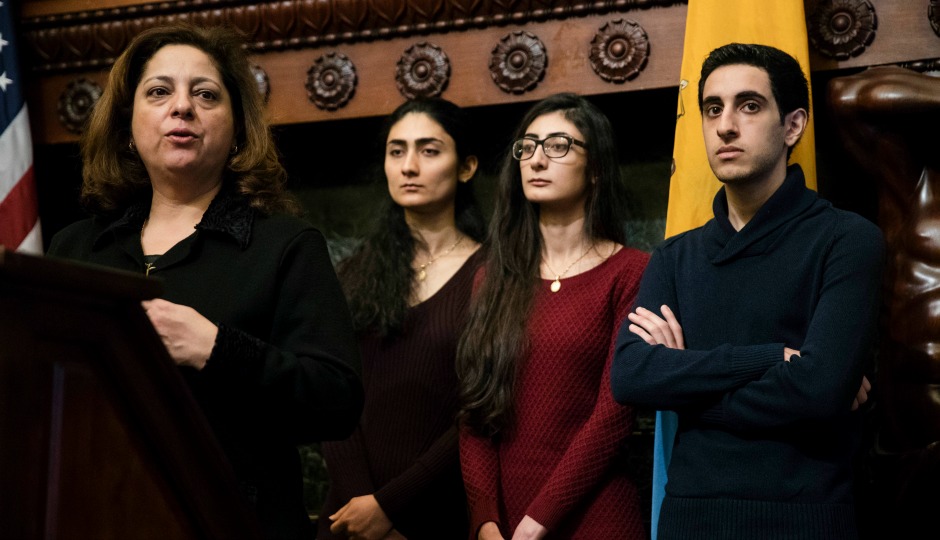WATCH: Syrian Family Deported From PHL Lands at JFK

Sarmad Assali, left, accompanied by her son Joseph Assali, and Farzaneh Ahmadi Darani, center left, and her sister Shadi Ahmadi Darani, speaks during a news conference at City Hall on January 31st. Family members of both the Ahmadi Darani’s and Assali’s were denied entry into the U.S. at PHL over the weekend due to President Donald Trump’s temporary ban on immigrants from seven Muslim-majority nations. (AP Photo/Matt Rourke)
The Syrian family who was deported from the Philadelphia International Airport on January 28th – one day after President Donald Trump passed his executive order on immigration – has returned to the country.
The six members of the Asali family (spelled “Assali” by some family members) landed at the John F. Kennedy International Airport in New York this morning, greeted by a small crowd of relatives, reporters, lawyers from the American Civil Liberties Union and politicians like U.S. Rep. Charlie Dent, a Republican from Lehigh Valley who helped push for the family’s return to the U.S.
Syrian family reunited with US family after 14 years. Turned back b/c @POTUS EO. Arrived minutes ago #JFK #NBC4NY #BREAKING pic.twitter.com/KZobbePcqU
— Katherine Creag (@katcreag4NY) February 6, 2017
@RepCharlieDent welcomes #Assali family at @JFKairport @69News pic.twitter.com/3JfSSBUAiG
— Rosa Duarte (@RosaDuarteTV) February 6, 2017
“We are grateful for Congressman Dent’s leadership and his efforts to right this wrong for the Asalis,” Reggie Shuford, executive director of the ACLU of Pennsylvania, said in a statement issued yesterday. “The executive order is illegal, and its implementation was botched from the start. The ACLU will continue to challenge this order until it is ultimately overturned.”
PHL officials sent the Asali family back to Doha, Qatar just hours after they landed in the country on January 28th, when their visas (along with the visas of about 90,000 others) were invalidated by the recent executive order, which bans Syrian refugees from entering the country, suspends all other refugee admission for 120 days and denies entry to civilians from Iran, Iraq, Libya, Somalia, Sudan, Syria and Yemen for 90 days – even if those citizens have visas.
Judge James Robart of the Federal District Court in Seattle issued a temporary restraining order on Trump’s ban just one day after it was signed, effectively suspending it. Yesterday, a federal appeals court rejected the government’s request to lift the judge’s order. The case will likely reach the Supreme Court.
The Damascus-based Asali family first filed for visas 14 years ago. They have several relatives in the U.S., including a nephew who attends Temple University and a brother living in Allentown, Pennsylvania, who had long prepared for their arrival.
Ghassan Assali of Allentown walks out with one of his brothers pic.twitter.com/cWtaU4dOdJ
— Andrew Wagaman (@AndrewWagaman) February 6, 2017
Members of the Asali family have since sued President Donald Trump, the Department of Homeland Security and Customs and Border Protection, arguing that the executive order not only violates the First Amendment by giving one religion preference over another, but also disregards the equal protection guarantee of the Due Process Clause of the Fifth Amendment. In the lawsuit filed last week in the U.S. District Court for the Eastern District of Pennsylvania, lawyers for the family requested that the government reinstate the family’s visas and arrange and pay for their immediate return to the country.
Exclusive video: Lawyers present Asalis with a liberty bell to welcome their new lives in PA. @NBCPhiladelphia pic.twitter.com/4uJPWhx9kT
— Alicia Victoria Lozano (@aliciavlozano) February 6, 2017
Lawyers for the Asalis are also representing Fatemeh Sheikhi, an Iranian woman who was denied entry to the country at PHL on the same day as the Asali’s.
The executive order prompted massive protests at airports around the country, including at PHL, where some officials – including Governor Tom Wolf and Mayor Jim Kenney – joined in to denounce the ban.
Follow @ClaireSasko on Twitter.


